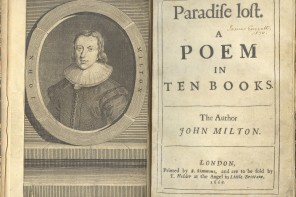 Every now and then, someone will challenge why I would consider thinking through literature theologically, or whether thinking about theological texts and scripture with all my skills and training in how to read literary texts is a valuable occupation for my time and energies. On one side, I’ve been questioned about whether I read and think about “Christian literature”? This question often comes from two types of interrogators: one group of people who seemingly wish to pigeon hole me as one of those academic type people they don’t really have to take seriously, and secondly, from people who want to reassure themselves that I’m reinforcing their long-held notions of good wholesome books for good Christian men and women.
Every now and then, someone will challenge why I would consider thinking through literature theologically, or whether thinking about theological texts and scripture with all my skills and training in how to read literary texts is a valuable occupation for my time and energies. On one side, I’ve been questioned about whether I read and think about “Christian literature”? This question often comes from two types of interrogators: one group of people who seemingly wish to pigeon hole me as one of those academic type people they don’t really have to take seriously, and secondly, from people who want to reassure themselves that I’m reinforcing their long-held notions of good wholesome books for good Christian men and women.
On another, I’m exhorted by individuals (sometimes merely in comments on Goannatree) who demand that there is a “complete vacancy” for any such thing as Christian literature and that the Bible should surely consume my interest and purview. Otherwise, all this learning is for nought. I want to pose two questions in this and the following post: firstly, is it helpful to have a category such as “Christian literature”?*, and secondly (my next post), what can I learn from reading literature that does not fit within the boundaries of the broadest of definitions of “Christian” literature?
It has not been a bad thing for me to realise how radical the project of thinking theologically about literature can be for many Christians. To have incredulous conversation partners who ask why you are not instead spending your time reading and studying the Scriptures – because that is when one will undoubtedly find God and his teaching – sharpens one’s wit and conscience. But as someone interested in apologetics and engagement with my own community, it is remiss of me not to understand the terms of the culture in which I live and to be able to make my apologetic arguments in those terms.
Secondly, all that I read and watch and experience I examine with a mind to both Scripture and traditions. The criteria by which I consider what is “good, worthy, holy” (Phil 4:8-9) is completely subjective but drawn also from what I have been taught about “how to read.” Having been encouraged to seek the numinous and value expressions of human experience and specifically the product and practice of human creativity, I contend that literature demonstrates, in the particular and the general, the desire for God innate in human beings, as his creation.
Is there such a thing as “Christian Literature”?
We could define “Christian Literature” as literature which affirms Christian theology or is merely a retelling of biblical narrative, or what C.S. Lewis terms, the ‘Christian myth’.*** And while this seems relatively straightforward, I am coming more to think that labelling a piece of writing, whether it be prose or poetry, Christian Literature is incredibly problematic. To call something “Christian Literature” sets that book apart, and depending on who is doing the naming may serve only to highlight or indicate that a work merely reinforces a particular view of Christianity.
Part of my concern is that many books sold as “Christian” literature, whether in Christian bookstores or large conglomerates, present within their fictional worlds theological implications that I find incredibly problematic. Literature can and does, as a basic principle, carry within it theological ideas and expressions of these. I think often, as humans, we are more comfortable when we can label things and find ownership in them. Thus, we are more comfortable as Christians when we feel safe in labelling an author, a “Christian” author, or a book, a “Christian” book. But, if we are not reading those books (especially fiction) we’ve labelled “Christian” carefully and critically, are we not merely whitewashing Truth?
Pilgrim’s Progress is a classic work of literature. But, I gain nothing more from it if I label it “Christian” if I don’t also read it savouring the deep implications of the metaphoric language. From Christian romance novels to series of books presenting a dramatised version of the apocalypse or any other Biblical event imagined, to call something “Christian” does not it seems (thankfully) also invoke a positive aesthetic judgment, but I would like to suggest that it does naturally cause us to be less critical as readers.
I would like to strongly advocate that it is important for everyone to learn how to be discerning in what they read and how they read. Just because a book presents a “Jesus” figure should not earn it the label of “Christian” literature. If we are going to use that label, there has to be something more substantial. Jeremy Begbie speaks of a possible definition of “Christian” literature in Voicing Creation’s Praise when he writes,
Whatever else ‘Christian art’ is, it will be art which takes for its final ‘realistic’ reference-point the raising of the crucified Son of God from the dead.”
When I’ve read a well-crafted novel, there’s a visceral sense I have of understanding a little more about beauty, about the world, and about Truth. Even more so, when I’ve read something that meets Begbie’s definition. To think about the richness of the outpouring of human creativity as indicative of being made in the image of God is valuable and turns my mind toward God rather than away; this kenotic creativity expresses the desire for the transcendent, the beautiful, and finally also demonstrates the necessity for the incarnational salvation offered in the life, death, and resurrection. Unfortunately, most of what passes for contemporary “Christian” literature just doesn’t do this for me. And until then, I fear the label “Christian” literature is at best overused and at worst meaningless (unless you’re referring to the Bible).
*** Lewis believed that ‘what might be myth in one world might be fact in another’ and that all mythology, religions and pagan ritual have their essence in the one ‘true myth’, which he understood to be a Christian understanding of God and his incarnate son Jesus Christ. See Lewis, CS (1798). Surprised by Joy. Glasgow: Fount Paperbacks, pp170-175.






Labels are both useful and reductive. Like surnames, they indicate a person’s history and linage, but they can also imply character traits and relationships that do not, in fact, exist. Labels are necessary marketing terms, without which many books would never reach our shelves at all. But when the label becomes more misleading than informative, then the label should be abandoned, or at least qualified.
In the classroom, I find myself avoiding the term “Christian literature” in favor of more historical terms: “medieval,” “Renaissance,” or even “literature of Christendom.” The last term is my name for literature written under the assumptions that (a) pretty much all its readers claim to be Christians; (b) a basic knowledge of Christian doctrine and biblical narrative is widespread and therefore unnecessary to explain; and (c) the Christian account of the order of the cosmos—divine nature, human nature, the physical world—is more or less true. In teaching a course called “The Literary Tradition,” I find it useful to group works of literature according to what they assume to be true of their readership and of the world they inhabit. Obviously, some contemporary books still fall into this category, while some Victorian books might not. In this sense, Augustine’s Confessions, Dante’s Comedy, Shakespeare’s Macbeth, Milton’s Paradise Lost, and Trollope’s Barchester Towers are part of the “literature of Christendom.” But so are the Left Behind series and all the doggerel of the CCM scene. Sophocles’s Oedipus Rex, Eliot’s Waste Land, and Beckett’s Godot are not, but neither are The New Yorker or Marvel Comics. (I reserve judgment on works like Lyrical Ballads, Whitman’s Leaves of Grass, and the novels of George Eliot. They seem like difficult cases in this schema.) This is not a measure of literary quality for me—just a useful category for organizing a syllabus.
When it comes to actually judging the moral quality a book, here is a useful test proposed by C. S. Lewis in his little-known essay “Christianity and Culture”:
“Suppose two books A and B. Suppose it can be truly said of A: ‘The very style of this book reveals great sensitivity and honesty, and a readiness for total commitments; excellent raw material for sanctity if ever the author were converted.’ And suppose it can be said of B: ‘The very style of this book betrays a wooly, compromising state of mind, knee-deep entangled in the materialistic values which the author thinks he has rejected.’ But might it not also be true to say of book A, ‘Despite its excellent latent implications, its ostensible purpose (which will corrupt thousands of readers) is the continued glorification of mortal sin’; and of B, ‘Despite its dreadful latent materialism, it does set courage and fidelity before the reader in an attractive light, and thousands of readers will be edified (though much less edified than they suppose) by reading it’? And is there not a danger of this second truth being neglected? We want the abstruse knowledge in addition to the obvious, not instead of it.” (from Christian Reflections 32)
I’m not sure I fully agree with Lewis on this point. I think many readers really do miss the obvious implications of a book while absorbing the assumptions of the book subconsciously. While I would have to classify book B as part of the “literature of Christendom,” I could call it “Christian literature” only with severe qualification of both words.
Steve, thanks for your thoughts and another Lewisian gem. I think like Jim and I, you are quite keen to be careful inferring an aesthetic judgment on the basis on labelling something “Christian literature” – i didn’t get into the problem of calling many works sold in the fiction section of “Christian bookshops,” or other bookshops for that matter, literature but you’ve encapsulated that nicely.
Would it be semantics to ask those around about us in churches to use the phrase “literature of Christendom” instead of “Christian Literature” – i wonder about charges of being inclusivist or of being PC. But for all of that, i think it is more helpful and for many bright intellectually curious men and women this kind of clarification could help sharpen their wits and senses. I just wonder how we go about seeking to nurture discerning readers around about us in the church.
I don’t know that I’d want to see my phrase “literature of Christendom” become regular parlance down at the local Christian bookshop, since it makes sense only when one has a general idea of what “Christendom” is, or was. But when we are engaged in conversations about books with other Christians who express opinions about what they call “Christian literature,” it is helpful to simply ask, “What do you mean by that?” Not in a confronting or aggressive way, of course, but in a way that invites a meaningful response. We will probably get one of the usual stock responses: “literature written by Christians to Christians for the purpose of encouraging virtue and discouraging vice”; or “literature about Christian people doing morally admirable things”; or “literature that has a Christian message [however vaguely defined].”
Now I haven’t read Begbie, but his statement sounds like a slightly more specific version of the last definition: literature with a Christian message, however that message may be defined by the reader. Perhaps I’ll have to go read his book to see what he means by that. On its face, his statement sounds attractive and theologically rich; I’m not sure, though, whether it represents a real advance on the customer at the local Christian bookshop looking for a novel with a “Christian message.”
When I was a teenager, I remember the Evangelical community going through a very similar argument about what qualified at “Christian music.” On one hand, there were the contemporary artists and fans who wanted desperately to show that Christianity was a property only of the song lyrics, and that the musical form was merely a vehicle for each song’s “message.” Ergo, all musical forms were admissible, so long as the words were morally acceptable and doctrinally innocuous, and so long as the people making the music were more or less Christian people. On the other side, there were the naysayers (Jimmy Swaggart comes to mind) who denounced the use of contemporary musical forms on the grounds that the music itself was inherently corrupted and corrupting, regardless of the lyrical content. The former party largely won the debate, for two reasons. First, their music was and is attractive to a young audience with money to spend, so regardless of opposition from mostly older people, they found a ready market for their music, and that market has largely replaced their predecessors in current church leadership. Second, and more importantly, they argued in a generally gracious way, while the opposition’s rhetoric was typically abrasive and virulent.
The problem, though, is that the naysayers probably had a point. Any good artist knows that form and content cannot be readily separated, and there are certain forms that are appropriate to certain types of content, which may well be morally objectionable. While the arguments of the naysayers were typically unsophisticated and reactionary, I’ve come to find out that they had a point. While some Christian musical artists began to modify the styles they appropriated from their secular counterparts, others began to modify their lyrical content in order to fit the styles.
Now, the analogy. It seems to me that too many Christian writers want to write “Christian” versions of contemporary genres without pausing to ask whether their Christian faith might require a modification of the genre. I think it a bit naive to assume that all genres are equally suited to honest and coherent expressions of Christian faith. If a thoughtful Christian artist is going to appropriate a form that was developed apart from Christian beliefs, he or she is going to have to consider modifying the form, however subtly. This is not a new phenomenon. It’s been done for almost two millennia. The lyric, the tragedy, and the epic all underwent significant changes with the rise of Christendom, and I hope that the same thing will happen with the romantic comedy, the action-thriller, and the documentary in this century.
Thanks for this interesting post. I have three questions and a comment. Sorry for the length, but I am interested in your answers.
First, it seems that you are worried that people will simply say “christian art” when they mean “good art.” In your words, you are worried that the label “christian” will “naturally cause us to be less critical as readers.” But then, using Begbie, it seems that you do offer content for the label “Christian” that also implies an aesthetic value judgment. So, does this then require you to say (ironically) that the only good art is “Christian” art? (with this very qualified understanding of “christian”)
Second, what examples do you have that fit Begbie’s definition? As appealing as Begbie’s definition is, I think that the most difficult thing about it is making a connection between a work of art and the “raising of the crucified son of God.”
Third, I wonder if you could explain what this sentence means: “The criteria by which I consider what is “good, worthy, holy” (Phil 4:8-9) is completely subjective but drawn also from what I have been taught about “how to read” and having been encouraged to seek the numinous and value expressions of human experience and specifically the product and practice of human creativity demonstrates, in the particular and the general the desire for God innate in human beings, as his creation.” It seems to me that you are saying that criteria for judging what is “good, worthy, holy” etc. is “completely subjective, and that you have been shaped by a variety of factors. But doesn’t Begbie offer an objective reference point for aesthetic judgement (or at least for judging what is “christian” art)?
Fourth (this is the comment), in the last line of your post, you commend the Bible as what you can most certainly refer to as “Christian” literature. It seems a little ironic (or at least anachronistic) that the Bible should fit this label when the majority of it was written before Christ. In other words, prior to Christ’s ministry (and probably even for awhile after that) no one could have conceived of the majority of the Biblical texts as Christian. If someone wanted to apply a label in this way to the Old Testament, I suppose they would have used “Jewish.” But this actually raises an interesting point that might approach an answer to my first question. Of course, Christians would like to refer to the whole Bible as “Christian.” And, it seems to me, many Christians would fill the content of this label “Christian” when they refer to the Bible with something like the definition that Begbie suggests. In other words, Christians have always interpreted the Old Testament as pointing towards Christ. Now, whether this notion of pointing towards Christ should have anything to do with a value judgment upon a work of art I suppose is another question. And it seems to me that aesthetic judgment must involve more than discerning a final ‘realistic’ reference-point in the raising of the crucified Son of God from the dead.
Jim,
I’m not sure that i intended to present such a cause and effect relationship between Christian art and good art, but i think, yes, my concern is that by labelling something “Christian” before considering the theological implications of such a label one’s critical faculties are some how dulled for any following aesthetic judgments. I think this is problematic. I’m not saying the only “good” art is “Christian” art, as i’m not completely clear on my thinking, but Begbie’s definition of what “Christian” art should be is appealing to me.
To answer your second question: let me offer an edited version of that sentence – i realise upon rereading that it was extremely unclear and for that i apologise –
“Secondly, all that I read and watch and experience I examine with a mind to both Scripture and traditions. The criteria by which I consider what is “good, worthy, holy” (Phil 4:8-9) is completely subjective but drawn also from what I have been taught about “how to read.” Having been encouraged to seek the numinous and value expressions of human experience and specifically the product and practice of human creativity, I contend that literature demonstrates, in the particular and the general, the desire for God innate in human beings, as his creation.”
While yes, i think there is subjectively in the aesthetic relationship to the moral goodness, I also find Begbie’s definition helpful, but not complete. I tried to clarify what i mean by a broader definition of art that is “good, worthy, holy” but may not meet Begbie’s christo-soterio-logical definition. Thanks for pushing me to express this section more clearly.
Yeah, as for examples of begbie’s defintion – i agree that the connection is the hardest part. In short, I’m not sure I can come up with any……but hopefully someone else can.
As for your fourth question, I feel like you answered it yourself, in the latter part of the final paragraph. I’m happy to clarify if needed, but I read the bible as a Christian, recognising that the old testament is also Jewish Literature. These labels, if they are actually going to be helpful cannot be mutually exclusive.
Finally, you say – “aesthetic judgment must involve more than discerning a final ‘realistic’ reference-point in the raising of the crucified Son of God from the dead.”” I agree. Hence, partly the motivation for my next post. I don’t know that i am the one to come up with any kind of definitive guide toward aesthetic judgment of literary texts… There are some books i’d recommend. I think Luke Ferretter’s “Towards a Christian Literary Theory” is quite helpful on this front.
Excellent post. I find your arguments compelling and also true to my own experience. I’m more interested in being a Christian who writes than in writing Christian books or Christian fiction or whatever. The emphasis should be on the person and how we interact with God and our world. Trying to bend our creativity into a kind of Christian form strikes me as deeply troubling and problematic. While truth can be conveyed in Christian literature, I think it runs the risk of falling flat in that an editor has to decide what can appear in a Christian book and what cannot. I think we lose so much in that process.
These are good things to think on. I look forward to your next post!
Thanks Ed, and glad to have your contribution to the discussion. If I may ask, tell us about that which you write?
This seems to apply to “Christian” film too. I love your point on a label possibly making us less critical. My husband is screenwriter for an indie film company (Whitestone Motion Pictures) that is led by Christians and approaches art from within that world view. BUT they strenuously resist making “Christian” movies. I think they’re on the right track.
Steph, thanks for your comment! Glad to have you here. We’d love to hear more about your husband’s work. I wonder (though i have an inkling) what it is about the “Christian” movies they so strenuously resist making them that puts them off. would you be willing to define some features of the movies they don’t make for us? I think these kinds of discussions are helpful for us all to push ourselves to make “good art” in all its senses.
Excellent. I often think the label “Christian literature” is overused and sometimes carries with it (unfairly or otherwise) a negative connotation. Like you mentioned, a “white washed” version of a story.
Katdish, thanks for your comment! Do you think calling something “Christian Literature” is all bad? is there anything redeemable in it? Is there an alternative to the label, Steve suggested the “literature of christendom” when talking about historical works – do you like that?